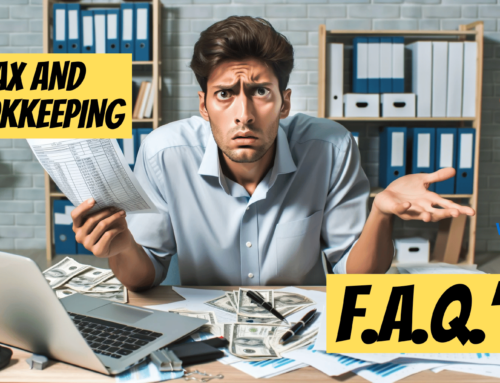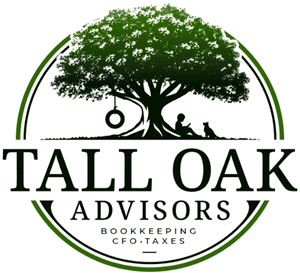Prepare Your Books For Taxes
Bookkeeping is a crucial aspect of managing your business finances. It plays a key role in the tax process, ensuring that your financial records are organized and accurate.
As a smaller eCom business owner, you may have not kept accurate records throughout the year. This can cause frustration, knowing it’s almost time for tax season!
I’m here to eliminate that confusion, and get you prepared for your eCom taxes!
There are three areas that you need to have prepared for taxes:
- Inventory
- Expenses
- Revenue
Let’s dig into each area:
Inventory
The first step in preparing your books for taxes is to have a clear understanding of your inventory. You need to know how much inventory you purchased, how much was sold, and how much you currently have on hand.
If you are using inventory management software like Inventory Lab or Seller Board, this information is likely already taken care of as long as you have been updating your buy cost in these tools.
However, neither of these tools calculates every piece of inventory you have. It doesn’t track inventory at your prep center, inventory in transit to you or your prep center, or your death pile to name a few.
For taxes, you need an inventory calculation as of December 31.
For a comprehensive calculation of your inventory as of December 31st, you can use our Physical Inventory Valuation Calculator.
This worksheet will guide you through the process of determining the value of your inventory.
Expenses
In addition to inventory, you need to accurately track and categorize your expenses. This involves linking your documentation, such as credit card statements or bank account transactions, to the original place of purchase. By categorizing your expenses, you can claim them in the appropriate tax categories.
If you prefer a do-it-yourself approach, you can use spreadsheets like Excel or Google Sheets to track and categorize your expenses.
Our Business Tax Worksheet provides a list of common expense categories and examples of what falls into each category. Simply download your bank statements and credit card transactions into a CSV spreadsheet and copy and paste the information into the Business Tax Worksheet. From there, you can categorize each transaction.
Alternatively, you can use accounting software like QuickBooks or Xero to streamline the process. By connecting your bank accounts and credit cards to these tools, you can automatically import your transactions. However, it is important to customize the chart of accounts to align with your e-commerce business. You can refer to our Business Tax Worksheet for the appropriate expense categories and manually categorize your transactions.
We are experts in bookkeeping for eCom sellers, so if this seems like too much, let us take care of it!
Revenue
Lastly, you need to account for your revenue. If your business exceeds a certain threshold, typically $20,000 in sales or 200 transactions, you will receive a 1099-K form. For larger selling platforms like Amazon or Shopify, we can obtain the necessary reports ourselves by requesting read-only access to your accounts. However, for smaller platforms, we may ask you to provide reports to ensure accurate reporting of your revenue and associated expenses.
If you have any loans for your business, such as bank loans, EIDL loans, or PayPal loans, we will also require documents related to these loans. Unlike loans within the Amazon ecosystem, which are usually included in the reporting provided by Amazon, loans from external sources need to be accounted for separately.
Conclusion
Bookkeeping may not be the most exciting topic, but it is undoubtedly the most critical aspect of the tax process. By ensuring your books are accurate and organized, you can avoid potential issues with the tax authorities and make informed business decisions based on your financials. While the methods discussed provide a stop-gap solution for tax preparation, we recommend considering a proper bookkeeping solution as your business grows.
If you find bookkeeping overwhelming or time-consuming, our bookkeeping team is here to help. We offer services to clean up your books for the previous year and provide ongoing bookkeeping solutions.
Prepare Your Books For Taxes
Bookkeeping is a crucial aspect of managing your business finances. It plays a key role in the tax process, ensuring that your financial records are organized and accurate.
As a smaller eCom business owner, you may have not kept accurate records throughout the year. This can cause frustration, knowing it’s almost time for tax season!
I’m here to eliminate that confusion, and get you prepared for your eCom taxes!
There are three areas that you need to have prepared for taxes:
- Inventory
- Expenses
- Revenue
Let’s dig into each area:
Inventory
The first step in preparing your books for taxes is to have a clear understanding of your inventory. You need to know how much inventory you purchased, how much was sold, and how much you currently have on hand.
If you are using inventory management software like Inventory Lab or Seller Board, this information is likely already taken care of as long as you have been updating your buy cost in these tools.
However, neither of these tools calculates every piece of inventory you have. It doesn’t track inventory at your prep center, inventory in transit to you or your prep center, or your death pile to name a few.
For taxes, you need an inventory calculation as of December 31.
For a comprehensive calculation of your inventory as of December 31st, you can use our Physical Inventory Valuation Calculator.
This worksheet will guide you through the process of determining the value of your inventory.
Expenses
In addition to inventory, you need to accurately track and categorize your expenses. This involves linking your documentation, such as credit card statements or bank account transactions, to the original place of purchase. By categorizing your expenses, you can claim them in the appropriate tax categories.
If you prefer a do-it-yourself approach, you can use spreadsheets like Excel or Google Sheets to track and categorize your expenses.
Our Business Tax Worksheet provides a list of common expense categories and examples of what falls into each category. Simply download your bank statements and credit card transactions into a CSV spreadsheet and copy and paste the information into the Business Tax Worksheet. From there, you can categorize each transaction.
Alternatively, you can use accounting software like QuickBooks or Xero to streamline the process. By connecting your bank accounts and credit cards to these tools, you can automatically import your transactions. However, it is important to customize the chart of accounts to align with your e-commerce business. You can refer to our Business Tax Worksheet for the appropriate expense categories and manually categorize your transactions.
We are experts in bookkeeping for eCom sellers, so if this seems like too much, let us take care of it!
Revenue
Lastly, you need to account for your revenue. If your business exceeds a certain threshold, typically $20,000 in sales or 200 transactions, you will receive a 1099-K form. For larger selling platforms like Amazon or Shopify, we can obtain the necessary reports ourselves by requesting read-only access to your accounts. However, for smaller platforms, we may ask you to provide reports to ensure accurate reporting of your revenue and associated expenses.
If you have any loans for your business, such as bank loans, EIDL loans, or PayPal loans, we will also require documents related to these loans. Unlike loans within the Amazon ecosystem, which are usually included in the reporting provided by Amazon, loans from external sources need to be accounted for separately.
Conclusion
Bookkeeping may not be the most exciting topic, but it is undoubtedly the most critical aspect of the tax process. By ensuring your books are accurate and organized, you can avoid potential issues with the tax authorities and make informed business decisions based on your financials. While the methods discussed provide a stop-gap solution for tax preparation, we recommend considering a proper bookkeeping solution as your business grows.
If you find bookkeeping overwhelming or time-consuming, our bookkeeping team is here to help. We offer services to clean up your books for the previous year and provide ongoing bookkeeping solutions.



